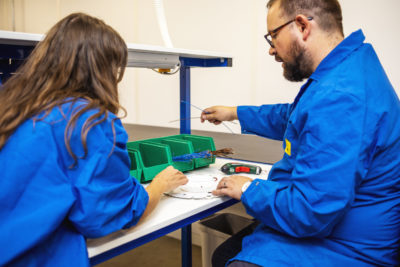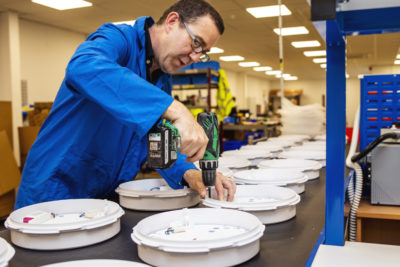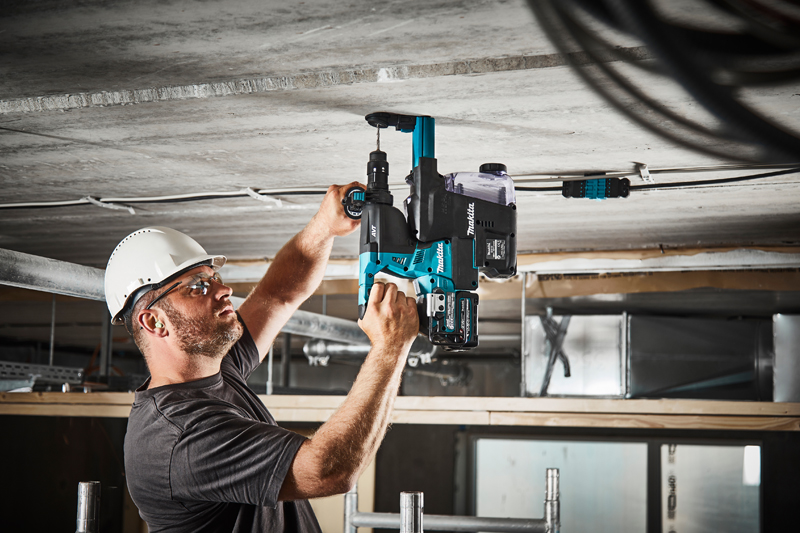The Coronavirus pandemic has made a worldwide impact on the way people can physically do business together. Consequently, the effect on previously well-established business models has been extreme, massively boosting online business, whilst causing disruption and delay to distribution due to increased domestic delivery demands. So, twelve months into the pandemic, what has been the virus’ effect on the electrical wholesale supply chain?
Manufacturers and importers are an essential component in the electrical supply chain, and the pandemic has severely disrupted this chain. Since the last quarter of 2020, we have been in the midst of a global shipping crisis caused by shipping containers used for moving large quantities of PPE around the globe, ending up causing bottlenecks at UK ports. Towards the end of last year, there were around 11,000 containers of PPE at the Port of Felixstowe alone, which clogged up the port, causing container ships to have to divert and unload at other ports, such as Rotterdam.
Rising costs
This impacts the electrical supply chain in terms of cost and security of supply. Cost increases have been significant; a 40ft container which used to cost around US $3,500 is currently over US $10,000 with quotes rising to over US$16,000! Inevitably, suppliers are passing on these costs with product price increases, many of which were announced at the beginning of the New Year.
In addition to these increased container costs, containers diverted to other ports on the continent are incurring significant added transport costs and delays getting them brought to the UK by road, further highlighting the supply chain’s fragility, particularly when the majority of raw materials and finished goods are sourced in China and the Far East.
Two approaches to combating these risks to the security of supply of electrical goods are to hold large stocks in the UK providing a short-term buffer to disruption, or to bring their manufacture from the Far East closer to home, offering a longer-term solution. NET LED Lighting, based in Cambridge adopts both these policies, holding around three months’ worth of stocks of commercial and industrial lighting at its UK warehouse, as well as manufacturing its most popular lighting ranges in-house in the UK.

Online options
The company moved quickly at the outset of the pandemic to upgrade its online order portal to being a fully integrated live sales platform. Wholesalers can place orders in under a minute, with quantity discounts automatically applied, and access to data sheets and installation instructions at the click of a button, as well as seeing live stock availability, enabling the wholesaler to provide an improved and more reliable service to its customers. This allowed NET LED Lighting to remain open for business during the lockdowns and throughout the whole pandemic, taking orders 24/7, with those placed before 5 p.m. being dispatched the same day, thereby ensuring national security of supply to electrical wholesalers. As has happened across the retail sector during the Coronavirus pandemic, wholesalers are also seeing an increase in the amount of business contractors and electricians are placing with them via click and collect, and online.
These new ways of controlling the supply chain, boosted by the pandemic, to ensure smooth security of supply of electrical goods, are here to stay. With reduced trade counter space to ensure social distancing, wholesalers have understandably prioritised customer visits over suppliers. The nature of the relationship with suppliers has changed, with wholesalers increasingly dealing with suppliers where possible by phone and via video calls, and placing their orders online. Like all areas of the economy, wholesalers have been hit by staff shortages caused by Covid-19 and contacts having to self-isolate, so fewer daily face-to-face meetings has generated needed savings in time and efficiency for both wholesalers and suppliers, with the additional benefit of a reduced carbon footprint.

The new normal
The UK Government has encouraged firms and tradespeople in the construction sector and its supply chain, including wholesalers, their suppliers and product manufacturers to continue to operate during national lockdowns, recognising that this industry is making a major contribution to the economic recovery following Covid-19. With the disruption caused by the virus to manufacturers, logistics and shipping, to wholesalers and to contractors, it has been necessary for each component to make changes to the way they do business, in some cases quite radically! It may be that these changes were going to happen eventually anyway, but the Covid effect has certainly speeded them up and made them the reality in 2021.
With the disruption caused by the virus to manufacturers, logistics and shipping, to wholesalers and to contractors, it has been necessary for each component to make changes to the way they do business, in some cases quite radically!
To see the reasons you should be working with NET LED, visit https://www.netledlighting.co.uk/





